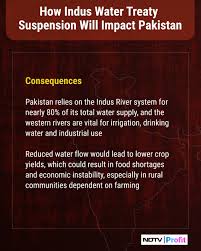Impact of Indus Waters Treaty Suspension on India and Pakistan

Introduction
The Indus Waters Treaty (IWT), signed in 1960, has long been regarded as a cornerstone in the water management and diplomatic relations between India and Pakistan. This treaty regulates the sharing of river waters from the Indus River system, and any suspension of its operations can have significant repercussions on both countries, especially regarding agriculture, energy production, and international relations.
Recent Developments
In recent news, tensions have escalated between India and Pakistan, culminating in discussions about the potential suspension of the IWT. India has raised concerns about Pakistan’s management of water resources, claiming violations of treaty terms. On the other hand, Pakistan has accused India of utilizing water as a geopolitical weapon. As this situation develops, experts warn that the suspension of the treaty could lead to serious consequences, including water scarcity in both nations.
Impact on Agriculture and Energy
For India, the suspension of the treaty could hinder agricultural output in states such as Punjab and Haryana that depend heavily on the rivers for irrigation. Economic analysts suggest that a significant reduction in water availability could lead to a decline in agricultural productivity, directly affecting food security and farmer livelihoods.
Similarly, Pakistan, which relies on water from the Indus system for more than 90% of its irrigation, would face dire consequences. Decreased water inflows could exacerbate the existing water crisis, affecting crop yields and potentially leading to increased tensions within the region.
Political Ramifications
The political climate surrounding the suspension falls under the lens of broader geopolitical maneuvering between India and Pakistan. Experts believe that such a move could destabilize not only bilateral relations but may also impact trade and cooperation in various sectors. The International community is closely monitoring the situation, with diplomatic channels being tested and potential international mediation discussions arising.
Conclusion
The suspension of the Indus Waters Treaty represents a critical juncture in India-Pakistan relations. The implications extend beyond water management to encompass economic, agricultural, and political dimensions. Both governments face pressure to navigate these turbulent waters effectively. Economic forecasts suggest that if the treaty is suspended, significant risks could emerge, emphasizing the need for dialogue and cooperative measures. The situation remains fluid, and both nations would benefit from approaching the challenge collaboratively to ensure mutual sustainability and regional stability.









